We're an affiliate
We hope you love the products we recommend! Just so you know, we may collect a share of sales or other compensation from the links on this page at no additional cost to you. Thank you if you use our links, we really appreciate it!
Sometimes cats over-groom to the point of damaging their skin but don’t worry; here’s a comprehensive guide on how to stop your cat from over-grooming.
Most pet parents choose cats over dogs because cats are known to be self-cleaning creatures. And to be fair, this common conception is true since most cats spend as much as 50% of the time they are awake grooming themselves or a fellow cat.
As a result, cats are typically clean animals, though in some cases, grooming can become a form of obsession.
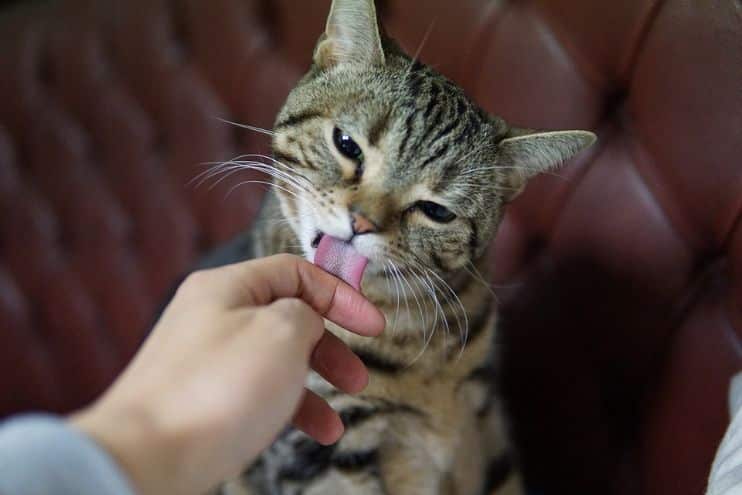
Some cats groom to the point where skin wounds and hair tend to shed. If it reached that point, your cat might be suffering from an underlying medical or psychological issue.
While a cat’s excessive grooming is not life-threatening, it is essential to seek your veterinarian as the symptoms can cause your cat’s discomfort.
In this article, we will be discussing why cats lick themselves and how we can tell if they are already over-grooming themselves.
Why Do Cats Lick Themselves?
Self-grooming is a well-known characteristic of cats that begins even when they are still kittens. It is exhibited when mothers lick their kittens to clean them, motivate the suckling, give comfort, and strengthen the bond.
When kittens reach four weeks of age, they begin grooming themselves. In their 5th week, they will begin to groom their mother and littermates to socialize. This self-grooming and mutual grooming, known as allogrooming, will continue into adulthood.
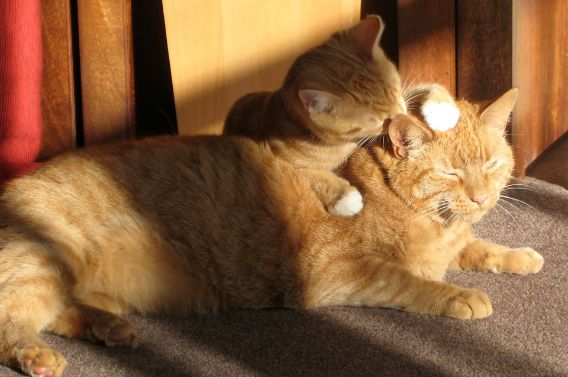
Wild cats that live in groups exhibit social grooming behavior, where they form a group and rub, lick, and gently bite each other.
They are seen most often interacting in this way with their closest members, often siblings and parents. Through these intimate grooming moments, relationships are solidified, and possible tensions are lessened.
Here are the reasons why cats love to groom themselves and why grooming is essential for a cat’s routine.
1. To Clean Themselves
It is natural for cats to remove dust, plant material, and other dirt from their body. Unlike dogs, who need regular baths, cats are better off cleaning themselves, and there has been a study on how cats groom themselves.
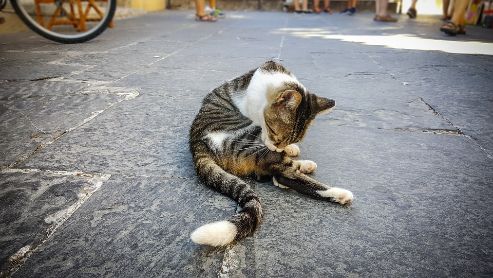
Cats have a special tongue made up of a unique kind of barb-like surface that helps keep them clean. Their tongue’s surface can wick saliva deep into their fur, and at the same time, allows hairs to be easily removed from the tongue. Think of it as a built-in comb on their tongue.
2. To Cleanse Wound and Injuries
Cats often lick the wounded or injured areas to cleanse them and prevent infection. Cat saliva contains enzymes that have natural healing and antibiotic properties.
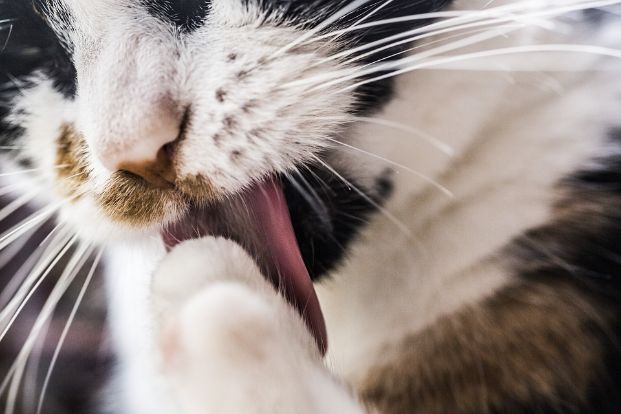
3. To Hide Their Scent From “Predators”
A cat’s sense of smell is fourteen times more sensitive than that of humans, and they use their heightened sense of smell to locate prey. A wild cat will try to hide her kittens by removing the evidence of their feeding.
Since domesticated house cats still have the instinct to think that they can become prey to bigger animals, they want to remove all smells that make predators smell them, such as residue of food from their fur.
4. To Lubricate the Coat and Skin
When cats groom themselves using their textured tongues, it stimulates the sebaceous glands at the base of their hairs and spreads the released sebum throughout the strands. This sebum will then coat their fur and protect it from water, sunlight, and other environmental elements.
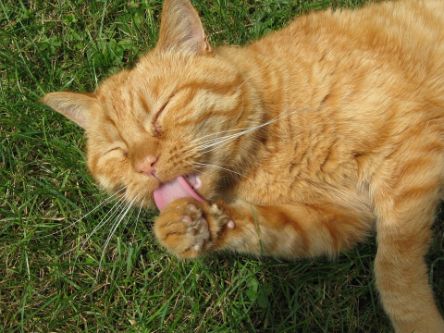
5. To Form Bonding
It is a heartwarming experience to see a cat grooming another cat. When cats start an allogrooming session, they begin a process of exchange of scents that will make them familiarized with each other. Additionally, by grooming each other, they can reach certain areas that are hard to get done by grooming alone.
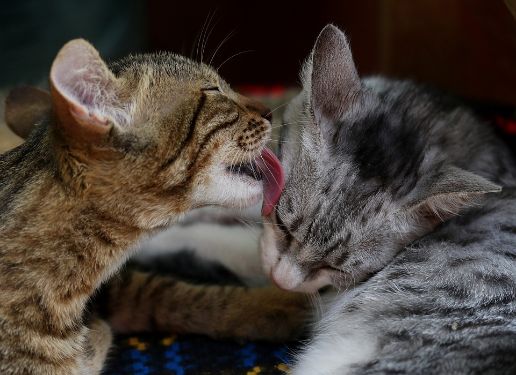
6. To Cool Down
Although cats have a few sweat glands in their paws, they don’t sweat like humans when it’s hot. Cats can cool themselves down when the weather is too hot, by damping their coat with their saliva.
7. To Relax
You may have witnessed your cat grooming herself after an embarrassing situation, such as falling from your couch. Cats get embarrassed too, and they exhibit a certain behavior called displacement behavior, which helps decrease the anxiety caused by embarrassment.
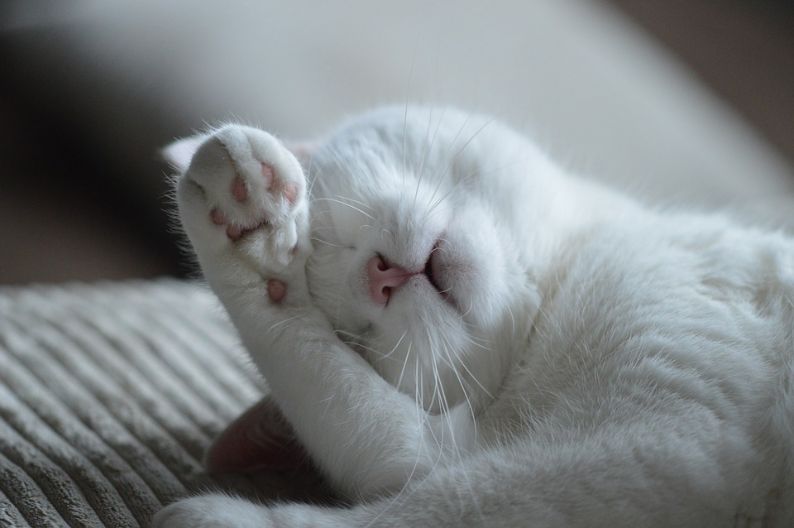
Displacement behavior is a cat’s out-of-context response to anxiety. Grooming is one of the manifested displacement behavior, and in essence, they are trying to self-medicate through licking during stressful situations. It is similar to humans who bite their nails when anxious.
However, if a cat is continuously stressed, she could resort to over-grooming to feel better. A cat excessively grooming can bring negative effects to their health, and for the following section, we will be tackling the effects of over-grooming and how we can avoid it as pet parents.
Understanding Cat’s Over-Grooming
As mentioned earlier, most cats spend 50% of their day grooming themselves. But if you start to notice excessive grooming, hair loss, or skin abrasions, it may be time for a visit to your veterinarian.
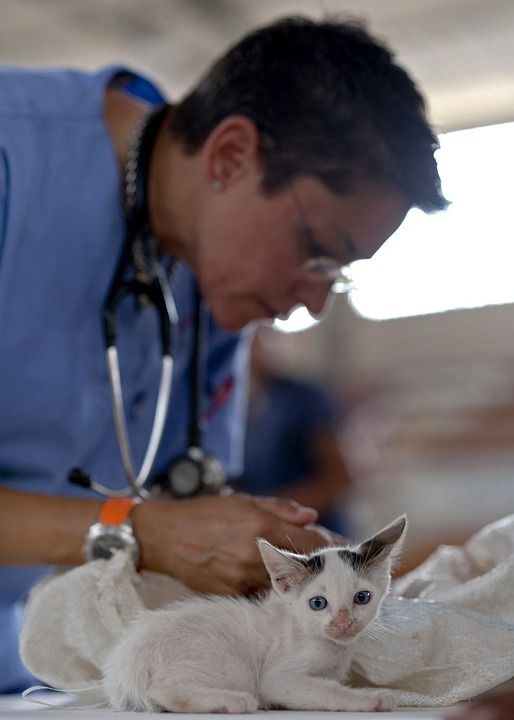
The reasons a cat overgrooms can be medical, behavioral, or psychological. It can be complicated to determine which of these causes your cat to lick excessively, so read on below and see if you can determine the reasons; if not, it is better to discuss this problem with your veterinarian.
Your veterinarian will go over your cat’s history to better figure out what is causing the problem. After the cause has been identified, treatment can be initiated.
What are the Signs of Over-Grooming?
The most dominant signs to watch out for if you suspect your cat is over-grooming are hair loss and skin irritation. The usually affected areas are the abdomen, legs, and chest since these are the most easily reached areas. Also, watch out for these signs:
- Grooming that interrupts your cat’s other activities
- Over the top scratching
- Redness, rashes, or scabs on bald areas
- Irritability and discomfort when scratching
What are the Causes of Over-Grooming in Cats?
To better handle your cat’s over-grooming habits, it is vital to understand what causes excessive licking in the first place. Your veterinarian can then address the underlying issues that can be associated with the cause.
Here are the most prevalent health conditions that can lead to uncontrolled self-grooming.
1. Allergy or Infection
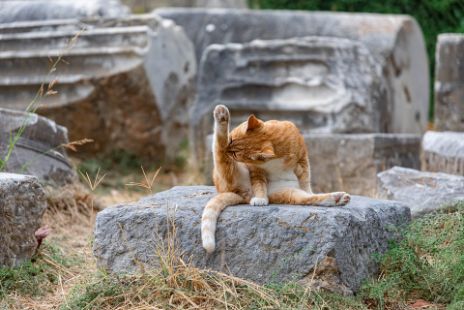
An infestation of fleas is the most common reason cats over-groom. Irritated skin can be caused by an infection, allergy, parasites, or substances in the environment that has stuck in it. Your cat’s fur loss may even give you a hint at the source of the problem.
To correctly diagnose and treat your cat, your veterinarian usually conducts diagnostic tests on the blood, skin, trial medication, and diet.
Once the flea issue is resolved, you might want to look at a cat flea collar that can keep fleas away from your cat.
2. Pain
Over-grooming can also sign that your cat is suffering from pain or discomfort, especially if they are repeatedly licking one area of their body.
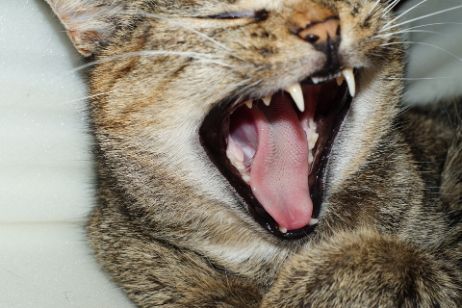
For example, disc disease can cause back pain, thus cats over-groom a particular spot on their back. Another example is if a cat has a urinary tract infection or anal sac impaction, it may lead to excessive grooming of the genital area.
3. Stress or Boredom
Some cats tend to over-groom as a way to distract themselves and cope up with stress or boredom. Veterinarians believe that when a cat licks herself, it results in endorphin secretion by the brain that helps relieve anxiety. If a stressed cat finds relief in licking, it can turn into a habit.
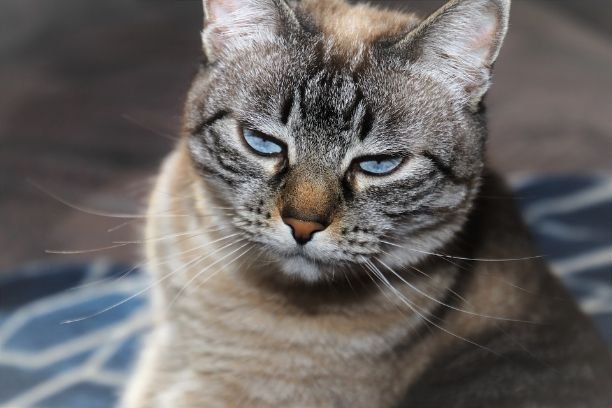
Cats are highly intelligent creatures and are also prone to boredom if their daily routine lacks proper stimulation and enrichment. An indoor cat with nothing much to do is more likely to adapt to over-grooming. In these cases, grooming makes up for the lack of mental and physical stimulation.
4. Psychogenic Alopecia
If your vet cannot find the underlying medical or environmental cause, your cat may be having psychogenic alopecia, a compulsive grooming disorder usually brought on by stress or anxiety.
We recently talked about how cats find self-grooming comforting; if they perceived a threat, they often groom themselves to feel calm if they encounter a sudden conflict or a sudden change in environment.
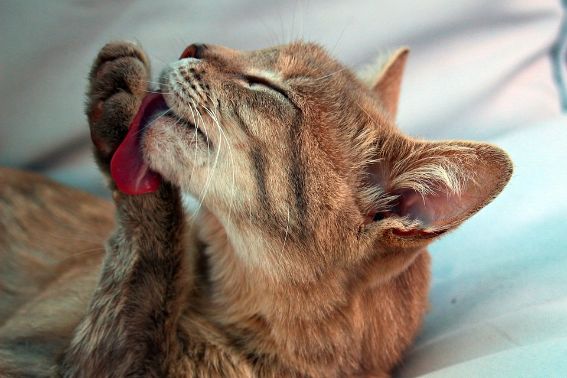
In most instances, the behavior will cease once the threat has disappeared. However, if the cat continues to lick and groom compulsively, the action has likely become compulsive and challenging for your cat to control even once the threat has gone.
While psychogenic alopecia is not life-threatening, it may be symptomatic of an overly stressed or anxious animal, so it’s important to seek effective treatment.
How to Stop Your Cat From Over-grooming?
The most important thing when handling excessive grooming is to address the cause. Your veterinarian can diagnose the cause and provide medical treatment or suggestions to discourage the habit if it’s behavioral or medical. So how to stop over grooming in cats?
1. Take Your Cat to the Vet
Your veterinarian will rule out any medical problems your cat may be having. Infections or allergies can be treated with appropriate medications, such as antibiotics, antihistamines, or anti-inflammatory drugs.
Keep your cat on flea medication regularly to help with flea allergies and ear mites. If your cat is in pain, your vet can determine its cause and manage it.
2. Provide Mental and Physical Stimulation
Be sure to provide environmental enrichment for your cat by using various toys, scratching posts, and frequent play opportunities.
Playing provides vital mental stimulation for your kitty by allowing her to exercise her cognitive and motor skills. This will help your cat build confidence and distraction from obsessively grooming.
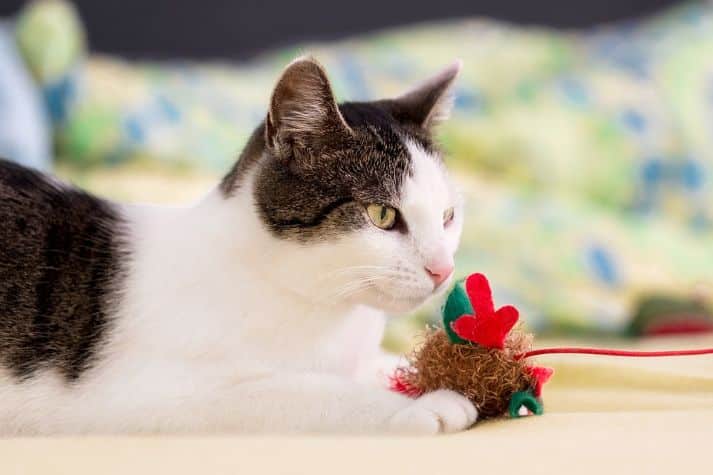
3. Use Cat Calming Medications and Products
Cats that are diagnosed with general anxiety may benefit from anti-anxiety medications and supplements that are to be prescribed by your veterinarian. Supplements are usually in the form of cat treats, so you will not have any problem administering it to your cat.
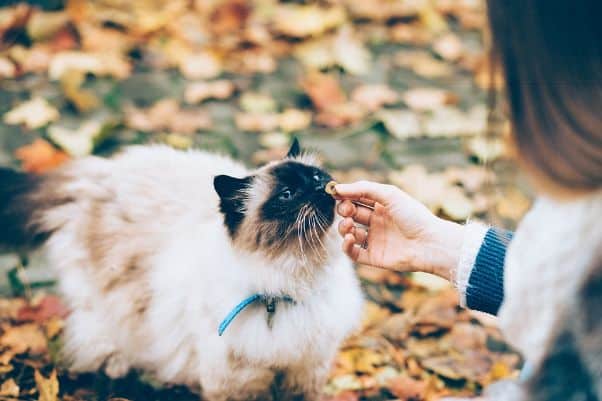
You can also try diffusers that disperse synthetic cat pheromones that will mimic the pheromone released by mother cats while nursing kittens.
5 Steps To Prevent Over-grooming
Prevention is better than cure, and as we all know, preventing illness can save us lots of money. There are specific activities and guidelines to follow to ensure that you create a comforting, stress-free environment to help them feel more relaxed, and in the long run, prevent them from developing over-grooming.
1. Know that cats can get stressed out easily
Cats are habitual creatures, and anything that disrupts their daily routine or makes them feel vulnerable can lead to stress. Similar to humans, cats need peace and calm whenever they feel stressed.

Put yourself in your furbaby’s perspective and find out what might be stressing them out, such as loud volume from the TV, screaming children, or noisy appliances like a vacuum cleaner.
2. Pamper your cat for ultimate relaxation
Make your home as cat-friendly as possible, and remember that they love lots of affection. Cats work best on a daily routine to help them feel more secure and in control.
Setting consistent times for food and playtime with your cat will help keep them happy.
Make sure your cat has a dedicated place to call as their own such as a cat bed or a corner of a room where less disturbance happens.
Many pet parents know that a cat will claim spots for itself, which might be your favorite chair, computer, or pillow. But if you have made them familiar with their own space, this will not be a problem.
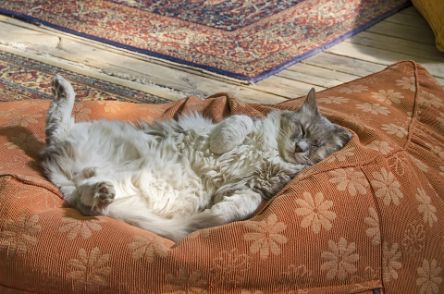
You should also ensure that you provide your cat with their everyday needs such as fresh water, food, a litter box, scratching posts, toys, treats, and plenty of cozy places to sleep.
3. Lessen or Remove the Trigger
Certain events such as moving, decorating, or introducing a new pet or a new family member can trigger your cat’s stress.
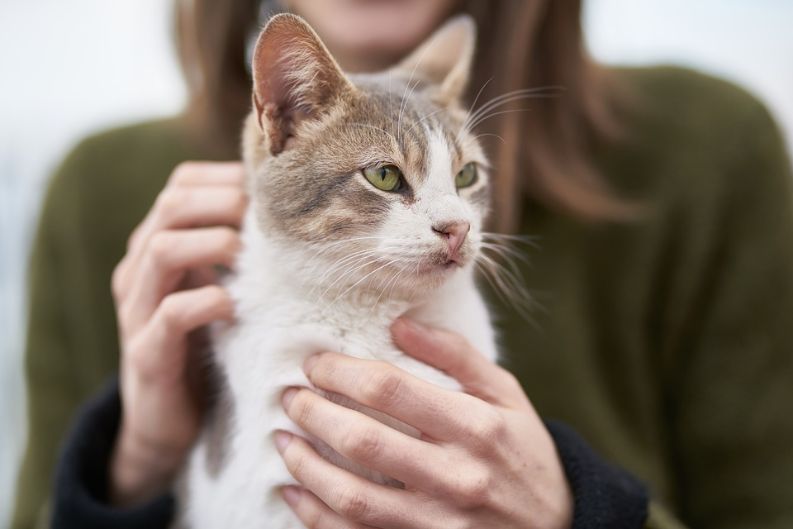
If you’re introducing changes around your home, then try and carry these out little by little.
If you’ve just moved to a new house, it’s best to keep your kitty in one room for a while containing all their necessities before letting them familiarize themselves with the rest of the house.
If your cat develops separation anxiety and you are worried about leaving them alone for quite some time, it is a must that there is someone that could keep an eye on them to avoid any incidents.
It can be your neighbor, your relative, or a professional cat sitter.
4. Avoid Negative Reinforcements
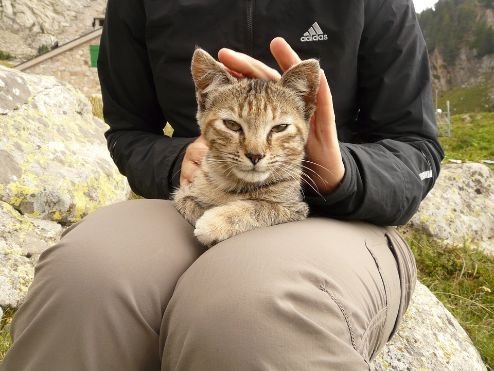
You should never punish your cat for their over-grooming behavior as this will only create more stress for them, and later on, can damage your bond.
If you notice your cat overgrooming, try to distract them by encouraging them to play with you. This will help relieve any stress they are feeling, and at the same time, strengthen your bond.
5. Lastly, Tender Loving Care!
Give them tender, loving care that they deserve. Show some TLC through interacting with them consistently and respond to their needs. A cat will stay happy with an ethical and responsible cat parent.
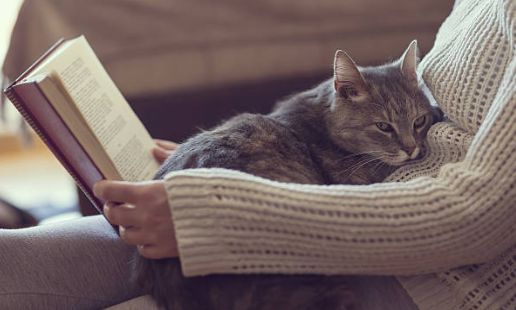
To Conclude
Remember that grooming is an essential behavior for your cat, but you’ll need to distinguish if they show signs of overgrooming to ensure that your cat’s grooming doesn’t get out of hand.
Do you have any other tips you can share with our pet parent community on how to stop your cat from over-grooming? Comment down below!
Laura is the founder of Furs'n'Paws. She is a also a pet writer and expert with more than 20 years of experience of working with dogs and cats. She developed a very strong love for animals at a young age. Her passion led her to establish a thriving pet sitting and dog walking business in Dubai. As an expert in pet training, behavior, and nutrition, Laura is committed to helping pet owners and pet lovers by offering high-quality information on a wide range of topics.


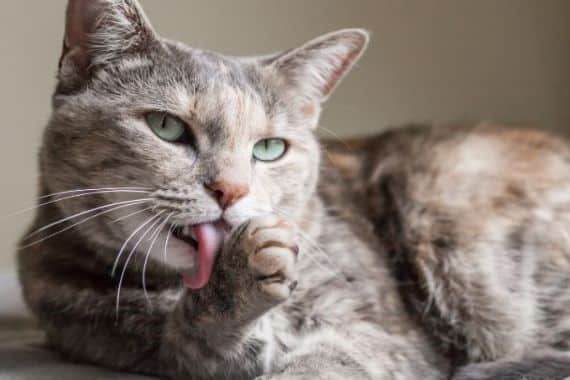
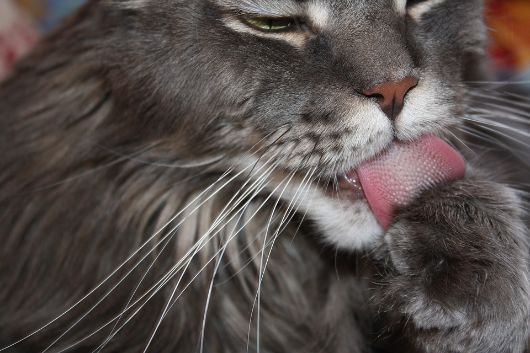

No responses yet